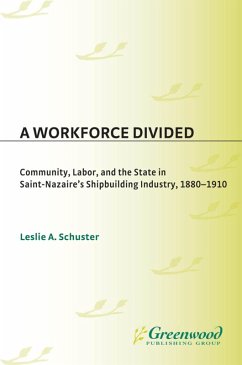In this study of the life and work of Saint-Nazaire's shipbuilding workers in the 30 years before World War I, Schuster shows that the consequences of industrial production for workers differed sharply according to their resources and experiences. She details the competing identities and divergent values maintained by shipbuilding workers, demonstrating that they were fostered by the interaction between state programs, industrial production, and the traditions pursued in the local realm. Third Republic economic policies for shipbuilding promoted unemployment and worker dependence on state officials over union leaders, and the uneven application of capitalist methods of production meant multiple workplace experiences that further undercut association. A workforce composed of industrial workers and agricultural producers brought markedly different priorities to the workplace. Urban-dwelling industrial workers proved dependent on shipbuilding, while workers commuting from La Grande Bri^D`ere, a nearby marshland, were property-owning producers, mostly peat-cutters, with traditions of self-government and a commanding community identity. They turned to ship production precisely to maintain rural settlement and agricultural production. These divergent values and responses to industrial work, in conjunction with multiple barriers to association, generated separate and even contrary labor concerns and protests.
Bitte wählen Sie Ihr Anliegen aus.
Rechnungen
Retourenschein anfordern
Bestellstatus
Storno









